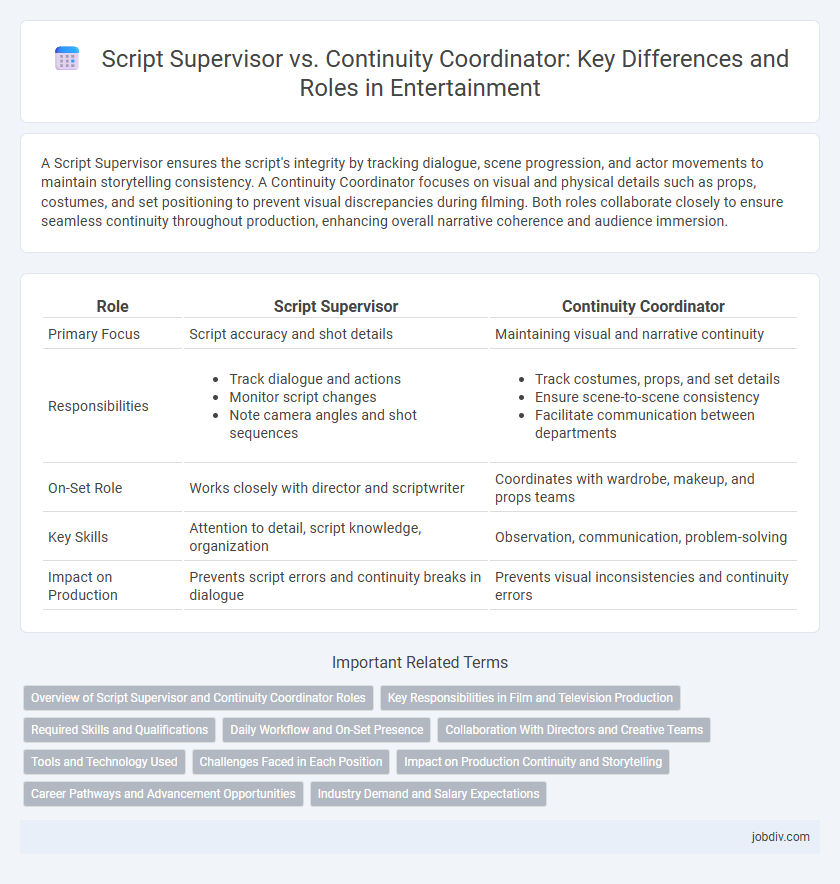A Script Supervisor ensures the script's integrity by tracking dialogue, scene progression, and actor movements to maintain storytelling consistency. A Continuity Coordinator focuses on visual and physical details such as props, costumes, and set positioning to prevent visual discrepancies during filming. Both roles collaborate closely to ensure seamless continuity throughout production, enhancing overall narrative coherence and audience immersion.
Table of Comparison
| Role | Script Supervisor | Continuity Coordinator |
|---|---|---|
| Primary Focus | Script accuracy and shot details | Maintaining visual and narrative continuity |
| Responsibilities |
|
|
| On-Set Role | Works closely with director and scriptwriter | Coordinates with wardrobe, makeup, and props teams |
| Key Skills | Attention to detail, script knowledge, organization | Observation, communication, problem-solving |
| Impact on Production | Prevents script errors and continuity breaks in dialogue | Prevents visual inconsistencies and continuity errors |
Overview of Script Supervisor and Continuity Coordinator Roles
Script supervisors oversee the detailed tracking of film and television production elements, ensuring dialogue, actions, and scene details remain consistent throughout shooting. Continuity coordinators focus specifically on maintaining visual and narrative coherence by monitoring costume, props, set design, and actor positioning between takes and scenes. Both roles are critical to preserving the integrity of the storyline and enabling seamless editing during post-production.
Key Responsibilities in Film and Television Production
A Script Supervisor meticulously tracks script details, ensuring dialogue, actions, and scene timings align with the screenplay to maintain narrative consistency throughout filming. The Continuity Coordinator focuses on visual and logistical continuity, managing props, costumes, set arrangements, and actor placements to prevent discrepancies between shots. Both roles are crucial in film and television production for preserving seamless storytelling and preventing costly reshoots.
Required Skills and Qualifications
Script Supervisors must have a keen eye for detail, strong organizational abilities, and expertise in script analysis to ensure consistency in dialogue, actions, and scene transitions. Continuity Coordinators require proficiency in tracking visual and audio continuity, excellent communication skills, and experience with scheduling software to maintain seamless production flow. Both roles demand familiarity with filmmaking processes, strong time management, and collaborative teamwork to support efficient on-set operations.
Daily Workflow and On-Set Presence
Script Supervisors meticulously track script details, scene continuity, and shot coverage throughout each filming day to ensure narrative coherence and consistent visual storytelling. Continuity Coordinators focus on maintaining physical and temporal consistency across scenes by managing props, wardrobe, and set details, often collaborating closely with departments during filming to prevent disruptions. Both roles require constant on-set presence, but Script Supervisors emphasize real-time script adjustments while Continuity Coordinators prioritize logistical alignment for seamless production flow.
Collaboration With Directors and Creative Teams
Script Supervisors and Continuity Coordinators play distinct yet complementary roles in collaboration with directors and creative teams on set. Script Supervisors meticulously track script details, dialogue, and shots to ensure consistency, facilitating clear communication between the director and other departments. Continuity Coordinators focus on maintaining visual and narrative continuity across scenes, enabling directors to achieve seamless storytelling and preserving the creative vision throughout production.
Tools and Technology Used
Script Supervisors rely on digital script analysis software, timecode syncing devices, and annotation apps to track dialogue accuracy, shot details, and continuity. Continuity Coordinators utilize specialized continuity logging systems, high-resolution cameras for visual confirmation, and database tools to maintain scene sequence and wardrobe consistency. Both roles increasingly integrate collaborative cloud platforms and mobile devices to streamline real-time updates during production.
Challenges Faced in Each Position
Script Supervisors face challenges in maintaining precise dialogue accuracy and shot details amidst fast-paced filming schedules, ensuring all elements align perfectly for post-production. Continuity Coordinators must meticulously track visual and narrative consistency across multiple scenes and locations, often dealing with complex wardrobe, props, and lighting changes that can disrupt story flow. Both roles require exceptional attention to detail, but Script Supervisors are more dialogue-focused while Continuity Coordinators handle broader scene-to-scene consistency challenges.
Impact on Production Continuity and Storytelling
Script Supervisors meticulously track scene details, dialogue, and actor movements to ensure visual and narrative consistency, reducing reshoots and enhancing storytelling coherence. Continuity Coordinators manage overall consistency in wardrobe, props, and set design across multiple departments, preventing discrepancies that could disrupt the viewer's immersion. Their combined efforts critically maintain seamless production continuity, directly influencing the film's pacing and audience engagement.
Career Pathways and Advancement Opportunities
Script Supervisors oversee script adherence, track scene details, and ensure continuity on set, offering advancement to roles like Assistant Director or Production Manager. Continuity Coordinators specialize in maintaining visual consistency across scenes, with career growth potential toward Post-Production Supervisor or Script Supervisor positions. Both roles require keen attention to detail and communication skills, forming foundational steps for broader production management careers.
Industry Demand and Salary Expectations
Script Supervisors and Continuity Coordinators both play vital roles in film and television production, with Script Supervisors often commanding higher salaries due to their extensive responsibilities in maintaining script accuracy and scene continuity. Industry demand for Script Supervisors remains robust, particularly in large-scale productions requiring meticulous attention to dialogue, shot details, and timing, while Continuity Coordinators are increasingly sought after in fast-paced environments like television series and commercials for their specialized focus on visual and narrative consistency. Salary expectations for Script Supervisors typically range from $40,000 to $80,000 annually, whereas Continuity Coordinators earn between $35,000 and $65,000, reflecting the variations in skill requirements and production scopes.
Script Supervisor vs Continuity Coordinator Infographic

 jobdiv.com
jobdiv.com